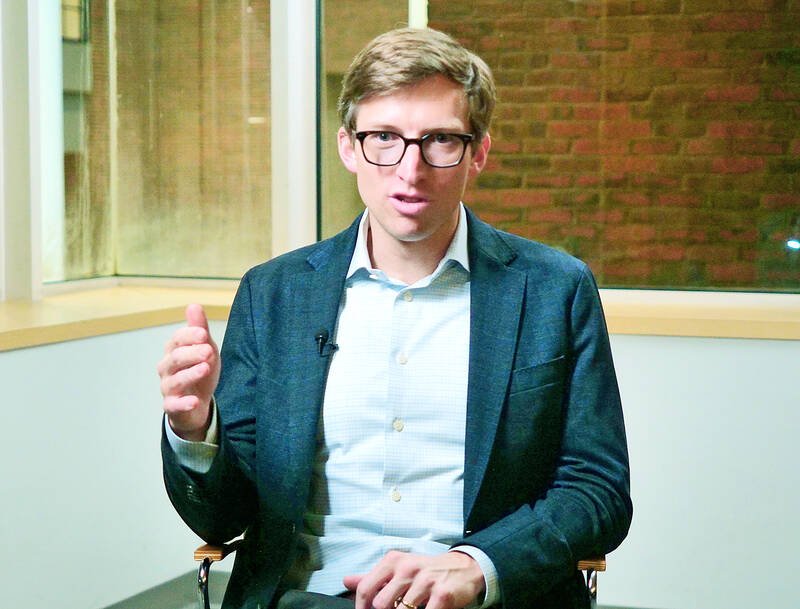Higher production costs and differing work cultures are unlikely to be decisive in the success or failure of Taiwan Semiconductor Manufacturing Co’s (TSMC, 台積電) expansion into the US, said Chris Miller, the author of Chip War: The Fight for the World’s Most Critical Technology.
In a recent interview, Miller, an associate professor at Tufts University’s Fletcher School of Law and Diplomacy, said that while Taiwan’s successful “model” in the chip industry is unlikely to be reproduced, Taiwanese companies still have to globalize their production in order to remain competitive.
To that end, TSMC has launched plans to build plants in Dresden, Germany, the US state of Arizona and Japan’s Kumamoto Prefecture.

Photo: CNA
The Arizona project in particular has faced a string of setbacks, including higher-than-expected costs, complaints by US employees of a “brutal” corporate culture, and construction delays at both factories it is building.
Despite these challenges, Miller said he disagreed with the notion that there is anything uniquely difficult about building chips in the US, adding that Samsung Electronics Co and Texas Instruments Inc both operated profitable plants there.
Intel Corp has also built chip plants in the US, and while they have had problems recently, those have mainly been related to design rather than construction, he said.
In terms of workplace culture, Miller said that leading countries in chip production — beginning with the US in the 1950s, then Japan and now Taiwan and South Korea — have always touted their respective work culture as being the best suited for the industry.
“It seems to me that the chip industry shifts too rapidly to have culture be a really effective explanatory factor,” Miller said.
Rather, in order to succeed, the onus is on companies to make sure that their work culture fits, or is capable of “assimilating,” in different geographies, he said.
Miller was also skeptical of the argument that higher production costs in the US would prove a major obstacle.
“TSMC’s success internationally has not been due to cost efficiency. It’s been due to better technology,” he said.
“I think over-focusing on cost underestimates what makes the Taiwanese workforce so effective,” which is related not to low wages, but the fact that they are highly skilled, he said.
Overall, Miller said he was waiting to see how TSMC worked through other challenges related to its US expansion, including making the Arizona facility work within its broader business.
As it does so, TSMC, as well as competitors Samsung and Intel, are all likely to receive assistance in the form of billions of dollars of US government subsidies, stemming from the Creating Helpful Incentives to Produce Semiconductors and Science Act in 2022, Miller said.

The US dollar was trading at NT$29.7 at 10am today on the Taipei Foreign Exchange, as the New Taiwan dollar gained NT$1.364 from the previous close last week. The NT dollar continued to rise today, after surging 3.07 percent on Friday. After opening at NT$30.91, the NT dollar gained more than NT$1 in just 15 minutes, briefly passing the NT$30 mark. Before the US Department of the Treasury's semi-annual currency report came out, expectations that the NT dollar would keep rising were already building. The NT dollar on Friday closed at NT$31.064, up by NT$0.953 — a 3.07 percent single-day gain. Today,

‘SHORT TERM’: The local currency would likely remain strong in the near term, driven by anticipated US trade pressure, capital inflows and expectations of a US Fed rate cut The US dollar is expected to fall below NT$30 in the near term, as traders anticipate increased pressure from Washington for Taiwan to allow the New Taiwan dollar to appreciate, Cathay United Bank (國泰世華銀行) chief economist Lin Chi-chao (林啟超) said. Following a sharp drop in the greenback against the NT dollar on Friday, Lin told the Central News Agency that the local currency is likely to remain strong in the short term, driven in part by market psychology surrounding anticipated US policy pressure. On Friday, the US dollar fell NT$0.953, or 3.07 percent, closing at NT$31.064 — its lowest level since Jan.

The New Taiwan dollar and Taiwanese stocks surged on signs that trade tensions between the world’s top two economies might start easing and as US tech earnings boosted the outlook of the nation’s semiconductor exports. The NT dollar strengthened as much as 3.8 percent versus the US dollar to 30.815, the biggest intraday gain since January 2011, closing at NT$31.064. The benchmark TAIEX jumped 2.73 percent to outperform the region’s equity gauges. Outlook for global trade improved after China said it is assessing possible trade talks with the US, providing a boost for the nation’s currency and shares. As the NT dollar

The Financial Supervisory Commission (FSC) yesterday met with some of the nation’s largest insurance companies as a skyrocketing New Taiwan dollar piles pressure on their hundreds of billions of dollars in US bond investments. The commission has asked some life insurance firms, among the biggest Asian holders of US debt, to discuss how the rapidly strengthening NT dollar has impacted their operations, people familiar with the matter said. The meeting took place as the NT dollar jumped as much as 5 percent yesterday, its biggest intraday gain in more than three decades. The local currency surged as exporters rushed to